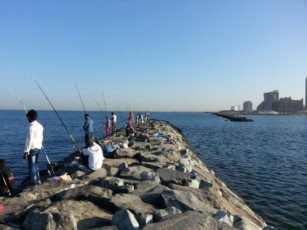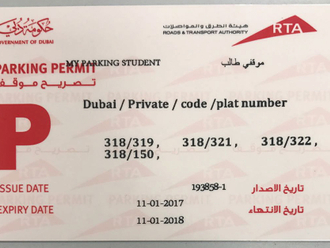
In May 2010, United Nations (UN) warned that the world faces the nightmare possibility of fishless oceans by 2050, unless fishing fleets are slashed and stocks allowed to recover.
UAE being a land that is not traditionally an agrarian economy, fishing has been a key food source for its people.
Fish stock assessment studies carried out by the Environment Agency-Abu Dhabi (EAD) in 2011 show a severe decline over the past 30 years.
The report stated that the most-favoured species like Hammour and Kingfish were being fished at more than seven times its sustainable level. Fish are being removed too early in their life cycle, not allowing them to spawn and preventing them from producing the next generation, consequently depleting future stocks.
Pavan Sukhdev, head of the UN Environment Program’s green economy initiative, in 2010, told journalists at a press meet in New York that the fishing fleet capacity in the world is ‘50 to 60 per cent’ higher than it should be.
To combat the problem in the UAE, Emirates Wildlife Society in association with World Wide Fund for Nature (EWS-WWF) launched ‘Choose Wisely’ campaign in 2010 with the aim of raising awareness to promote sustainable fisheries.
According to UAE Interact, a website supported by The National Media Council, the authorities have made a number of efforts to maintain the fish resources.
Earlier this year the Ministry of Environment and Water (MoEW) said that the development of a 360,000-square-metre fish reserve in Dhadna has commenced. It is meant to become the primary feeding area for demersal (bottom dwelling) fish off the coast of Fujairah. Several fishing spots will be revived with reef balls to encourage environmently friendly fishing.
In June 2013, Dubai Municipality released 70,000 fingerlings of Sobaity and Sha’am fishes in the Arabian Sea near Mamzar, in order to preserve the environment and biodiversity.
In July 2013, MoEW and the Municipality and Planning Department of Ajman released 15,000 fingerlings (juvenile fish) into the waters of Al Zawra natural reserve in Ajman. The MoEW also released the first batch of Hammour, Safi, Subaiti and Sha’am fingerlings into the waters of Khour Umm Al Quwain creek.
In April 2013, about 1,500 fishing boats in Abu Dhabi were asked to avoid catching popular sea fish Al Badah (Longtail Silver Biddy) following a temporary two month ban on its fishing and sale issued by the MoEW.
Fishing laws int he UAE:
According to a 2007 Gulf News report, under UAE law it is illegal to catch undersize fish [size requirements differ depending on the species], to use less than 2 inches mesh in fish traps or less than 1 inch fishing nets. Bottom trawling is also not allowed in the territorial waters of the UAE.
Shark fins are a popular delicacy in the UAE. Considered an aphrodisiac, a kilo can set you back between Dh300 and Dh700. Finning is prohibited in the UAE as is bringing shark fins to the shore, separate from the body. Therefore catching shark is legal as long as it is brought back to shore and all parts are put on the market. Comparatively though, they are not worth much.
Individuals who want to go fishing must obtain a licence from the municipality for recreational fishing — whether it is along the coastline or in leisure boats.
Facts about fishing:
WORLD
1 billion people, mostly from poorer countries, rely on fish as their main source of animal protein in their diet.
35 million people are fishing around the world on 20 million boats.
170 million jobs depend directly or indirectly on the sector, bringing the total web of people financially linked is 520 million.
World capture fisheries production in 2006 was about 92 million tonnes, with an estimated first sale value of $91.2 billion.
Source: United Nations (UN)
UAE
66% of UAE residents eat fish at least once a week.
50% of UAE fish consumers order Hammour when eating at a restaurant. Hammour is the UAE’s most popular fish and is the most overfished.
87-92% decline of fish that are in the same family as Hammour between 1978 and 2003
Hammour is currently being fished at over seven times the sustainable level.
This decline is related to intense coastal development and unsustainable fishing.
Source: EWS-WWF Choose Wisely campaign
How can you help?
Choose your fish wisely. EWS-WWF Choose Wisely campaign has categorised the fish as below:
- GREEN CATEGORY (Go for it): Jesh Um Al Hala, Faskar, Ebzimi, Anfooz, Shaari Eshkeli, Yanam, Naiser, Shaam, Hilali, Khan, Durduman
- ORANGE CATEGORY (Good choice, but there’s better): Badah, Souti, Aqatah, Kofar, Beyah Arabi
- RED CATEGORY (Think again! Overfished): Hammour, Shaari, Fersh, Zuraidi, Kanaad, Yemah, Safi Arabi, Qabit
If you only buy the fish in the green category, it’s not only good for the environment but also for your pocket, as it is cheaper.
Be aware that many small Hammour available on the market are actually baby Hammour, Buying these creates a market for undersized fish and exacerbates overfishing.
Avoid buying or ordering shark meat as much as possible.
Stay informed and spread awareness about the red category of fish.






